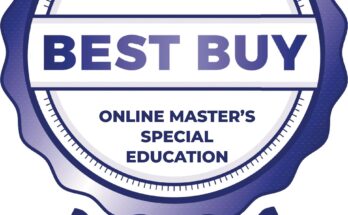The demand for exceptional elementary school teachers is consistently growing in the ever-changing field of education. If you are interested in a fulfilling career shaping young minds, elementary education degrees online offer a flexible and accessible path. These programs allow aspiring educators to balance their studies with personal and professional commitments, opening doors to a truly rewarding profession.
Embracing the Convenience of Online Learning
The rise of online education has been nothing short of transformative. Driven by advancements in technology and the changing needs of students, this innovative approach has gained immense popularity over the past decade. For those seeking a career in elementary education, the convenience of online learning is a game-changer.
By eliminating the constraints of a traditional classroom, online programs allow you to tailor your studies around your schedule. Whether you’re juggling work, family responsibilities, or other commitments, you can access course materials, participate in discussions, and submit assignments at your own pace. This flexibility caters to diverse learners, including those who may have previously felt limited in their pursuit of a teaching career due to geographical or time constraints.
Moreover, the proliferation of online elementary education programs reflects the growing recognition of the vital role that quality education plays in shaping the future. As schools seek innovative ways to attract and retain talented educators, these digital offerings have emerged as a viable solution. With a focus on modern teaching methods and seamless technology integration, online programs are preparing graduates to meet the evolving needs of 21st-century classrooms.

Ensuring Academic Excellence and Licensure for Elementary Education Degrees Online
When exploring online elementary education degrees, it’s crucial to prioritize accreditation and licensure. Accreditation, particularly by the Council for Accreditation of Educator Preparation (CAEP), guarantees that the program meets rigorous academic standards and adequately prepares you for the challenges of teaching.
Obtaining a teaching license is another essential step on your journey to becoming an elementary educator. The specific requirements for licensure can vary by state, so it’s crucial to research the guidelines for the region where you plan to teach. Most states require candidates to complete an accredited degree program, pass state-mandated examinations, and undergo a comprehensive background check.
Many online programs offer invaluable guidance and support throughout the licensure process, ensuring that you are well-prepared for the necessary examinations and requirements. This level of assistance can be instrumental in helping you transition from the classroom to the front of the classroom, where you can begin making a meaningful impact on the lives of young learners.
Choosing the Right Online Learning Format
When it comes to online elementary education programs, you’ll find a diverse range of learning formats to choose from, each catering to different learning styles and lifestyles. Understanding these options can help you select the best fit for your unique needs and aspirations.
Asynchronous Learning: Flexibility at Your Fingertips
Asynchronous programs provide you with the ultimate flexibility, allowing you to access course materials, watch recorded lectures, and complete assignments on your own schedule. This format is particularly appealing for those juggling work, family, or other commitments, as it enables you to engage with the coursework when it’s most convenient for you.
Asynchronous learning fosters self-discipline and time management skills, as you’ll be responsible for keeping pace with your studies. This approach can be especially beneficial for adult learners who are returning to education with the goal of advancing their careers in elementary education.

Synchronous Learning: Fostering Connections
In contrast, synchronous programs involve real-time virtual classes, where you’ll need to log in at specific times to participate in discussions and interact with your instructors and peers. This format can create a dynamic classroom environment, allowing for immediate feedback and collaborative activities.
While the synchronous approach may be more challenging for those with conflicting schedules, it can enhance your engagement and motivation by providing opportunities for live interactions. The sense of community fostered in these programs can also be invaluable as you navigate your educational journey.
Blended Learning: The Best of Both Worlds
For those seeking a balanced approach, blended programs combine online coursework with in-person components, offering the advantages of both online and traditional education. This hybrid model may involve attending classes on campus for specific subjects or participating in hands-on learning experiences.
By engaging in both virtual and face-to-face activities, blended learning allows you to build relationships with your peers and faculty, which can be particularly beneficial for networking and support throughout your career. Additionally, the hands-on opportunities can enhance your practical skills and provide a well-rounded educational experience.

Unlocking a World of Rewarding Career Paths
Earning an online degree in elementary education opens the door to a diverse range of career paths within the education sector, each offering the opportunity to make a meaningful impact on the lives of young learners.
Inspiring as a Classroom Teacher
The most common career path for elementary education graduates is that of a classroom teacher. As an elementary school teacher, you’ll play a pivotal role in shaping the academic and social development of students in grades K-6. This multifaceted role involves creating engaging lesson plans, assessing student progress, and fostering a positive and inclusive learning environment.
In this rewarding position, you’ll work closely with parents and guardians to ensure that your students receive the support they need to thrive. Collaboration with fellow educators will also be essential as you develop curriculum and implement effective teaching strategies tailored to the diverse needs of your students.
Guiding as an Instructional Coach
Another career option that allows you to leverage your expertise is that of an instructional coach. In this role, you’ll support and mentor teachers within a school or district, helping them enhance their teaching practices and improve student outcomes. Instructional coaches often facilitate professional development opportunities and foster collaboration among educators.
As an instructional coach, you’ll analyze student data to identify areas for improvement and develop targeted interventions. Your role will be crucial in cultivating a culture of continuous learning and growth within the school community, ensuring that both teachers and students reach their full potential.
Advocating as a Special Education Teacher
The growing demand for special education teachers presents a particularly rewarding career path for those passionate about working with diverse learners. As a special education teacher, you’ll focus on meeting the unique needs of students with disabilities, employing specialized teaching strategies and individualized education programs (IEPs) to foster academic success.
In this role, you’ll be an advocate for your students, ensuring they receive the necessary resources and support to thrive in the classroom. Collaboration with parents, therapists, and other professionals will be essential in creating a comprehensive support system for your students.
Exploring Additional Opportunities
The versatility of an online elementary education degree extends beyond the traditional classroom. Graduates may also explore opportunities in curriculum development, educational administration, or early childhood education, applying their skills and knowledge in a variety of settings.
Curriculum developers play a crucial role in creating and refining educational materials and resources that align with state standards and best practices. Educational administrators, on the other hand, may take on leadership roles within schools or districts, overseeing operations and ensuring the effective implementation of educational policies.
Selecting the Right Online Elementary Education Program
When searching for the best online elementary education programs, it’s essential to consider several key factors to ensure the program aligns with your goals and needs.
Prioritizing Program Reputation
The reputation of the institution offering the online program is a crucial consideration. Researching the college or university’s history, faculty qualifications, and student success rates can provide valuable insights into the overall quality of the program.
A reputable program can enhance your job prospects after graduation, as employers often seek candidates from well-regarded institutions. Additionally, strong program recognition may offer networking opportunities and connections to potential employers in the education sector.
Evaluating Curriculum and Practical Experience
A comprehensive curriculum is essential for preparing future elementary educators. Look for programs that cover a range of crucial topics, including child development, instructional strategies, classroom management, and technology integration. A well-rounded education will equip you with the skills necessary to thrive in diverse teaching environments.
Practical experience is also a vital component of a high-quality online elementary education program. Seek out opportunities for student teaching or field placements, as gaining hands-on experience in real classroom settings is crucial for developing the skills and confidence needed to succeed as an educator.
Seeking Faculty Expertise
Experienced and qualified faculty members can significantly enhance your educational experience. Instructors who have firsthand teaching experience can provide valuable insights and support throughout your studies, sharing real-world strategies and best practices.
Faculty members who are actively engaged in the education community may also offer connections to resources, professional development opportunities, and mentorship. Building relationships with these experts can enrich your learning experience and provide invaluable guidance as you navigate your career path.
Prioritizing Student Support
Consider the availability of comprehensive student support services, such as academic advising, online tutoring, and career counseling. These resources can make a significant difference in your academic success and overall learning experience.
Programs that prioritize student support often foster a more positive and engaging learning environment, helping you feel connected to your institution and better equipped to overcome any challenges you may face.
Exploring Cost and Financial Aid Options
Tuition rates and fees can vary widely among online elementary education programs. It’s essential to evaluate the cost of each program and explore financial aid options, such as scholarships and grants, to make your education more affordable.
Many institutions offer financial aid packages to help students cover the costs of their education. Additionally, some online programs may have lower tuition rates than traditional on-campus programs, making them a cost-effective choice for aspiring elementary educators.
Frequently Asked Questions
What are the admission requirements for online elementary education programs?
Admission requirements typically include a high school diploma or GED, a minimum GPA, and the completion of prerequisite courses. The specific requirements may vary by program, so be sure to research the guidelines for the institutions you’re considering.
How long does it take to complete an online elementary education degree?
The duration of an online program can vary based on factors such as the program format, the number of courses you take each semester, and any transfer credits you may have. Many online elementary education programs can be completed in 4 years or less, depending on your schedule and academic pace.
What are the costs associated with an online elementary education degree?
Tuition rates and fees for online elementary education programs can vary significantly by institution. It’s essential to research the costs and explore potential financial aid options, such as scholarships, grants, and student loans, to make your education more affordable.
Can I transfer credits from previous coursework?
Yes, many online programs accept transfer credits, which can help reduce the time and cost of completing your elementary education degree. Be sure to check with the specific programs you’re interested in to understand their transfer credit policies.
In the ever-evolving landscape of education, the demand for exceptional elementary school teachers continues to soar. By pursuing an online degree in elementary education, you can embark on a rewarding career path that allows you to make a profound impact on the lives of young learners.
Whether you’re seeking the flexibility of asynchronous learning, the interactive nature of synchronous programs, or the balanced approach of blended formats, online elementary education degrees offer a tailored solution to fit your unique needs and aspirations. With a focus on academic excellence, practical experience, and comprehensive support, these programs are designed to prepare you for the challenges and joys of teaching in the 21st-century classroom.
As you explore the diverse career opportunities available to elementary education graduates, from inspiring students as a classroom teacher to advocating for diverse learners as a special education specialist, remember that your journey begins with the right online program. By selecting an accredited institution with a strong reputation and a curriculum aligned with your goals, you’ll be well on your way to unlocking a rewarding and fulfilling career in the field of education.
Take the first step today and embark on your path to becoming a transformative elementary educator. With the flexibility and accessibility of online learning, the world of educational excellence is within your reach.



